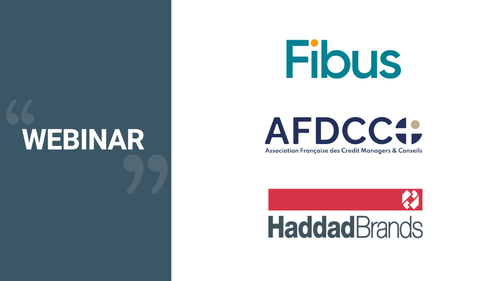Private Equity: why should factoring be anticipated?
Cheaper, more flexible, and more efficient: factoring remains the most attractive form of short-term financing. However, to deploy it to its full potential and at the most opportune moment, it needs to be considered well in advance. This allows the shareholder to choose their objective: financing growth—whether external or organic—or facilitating dividend payments.
Interview with Thibaut Robet and Maxime Bertin, published in Les Décideurs.
Interview with Thibaut Robet and Maxime Bertin, published in Les Décideurs.


Interviewees
Thibaut Robet founded Fibus (formerly Chateaudun Crédit) with Gaëtan du Halgouët in 2006. Fibus specializes in factoring consulting for Private Equity funds: today, 4 out of 5 operations conducted by Fibus serve companies under LBO. Maxime Bertin, who joined Fibus in 2018, is the Deputy Managing Director responsible for Fibus Factoring.
Factoring continues to make inroads in the world of Private Equity: from Small to Large Cap, it supports shareholders throughout their strategies for developing their investments.
Factoring continues to make inroads in the world of Private Equity: from Small to Large Cap, it supports shareholders throughout their strategies for developing their investments.
Could you briefly explain what factoring is?
Thibaut Robet: In simple terms, factoring is two months of turnover in cash. It is short-term financing reserved for the B2B sector. It relies on the company's receivables, specifically the payment terms of its clients. Factoring allows for payment in 1 or 2 days instead of waiting for the invoice due date.
Maxime Bertin: Let's take two examples. For a company with a turnover of €60 million, factoring represents financing of around €10 million. On a larger scale, a company with a turnover of €3 billion can expect financing of €500 million through factoring: it's very substantial.
T.R.: In France, companies are generally paid within 60 days, hence the two months I mentioned earlier – but this can sometimes extend to 90 or even 120 days depending on your industry and the country where your clients are located.
"Factoring enables the financing of growth and secures the cash flow of holdings."
Maxime Bertin: Let's take two examples. For a company with a turnover of €60 million, factoring represents financing of around €10 million. On a larger scale, a company with a turnover of €3 billion can expect financing of €500 million through factoring: it's very substantial.
T.R.: In France, companies are generally paid within 60 days, hence the two months I mentioned earlier – but this can sometimes extend to 90 or even 120 days depending on your industry and the country where your clients are located.
"Factoring enables the financing of growth and secures the cash flow of holdings."
You have been working with Private Equity funds for over 15 years. What are the advantages of factoring for a fund compared to other types of financing?
T.R.: Factoring is fast and off-balance-sheet financing: it allows funds to quickly secure the cash flow of their portfolio companies. It is the most efficient financing a fund can have to support a company's lifecycle. It can be triggered at different times depending on what best serves the shareholder's strategy.
M.B.: A fund can decide to trigger factoring financing immediately after acquiring a stake to secure the operation. In the longer term, it can also choose to finance the company's growth, whether external or organic, or make the company self-sufficient in cash. Factoring can also be used to facilitate dividend payments or refinance shareholder loans.
T.R.: Factoring is the cheapest financing for companies under LBO. The margin over the official rate is between 1.5% and 2%, which is much less expensive than Debt, Equity, or an RCF, hence its appeal to funds. Compared to traditional overdrafts, it offers larger financing. Another strong point: due to its off-balance-sheet nature, factoring does not impact the company's debt leverage.
M.B.: Other aspects of factoring also attract funds: its confidentiality, stability, and flexibility. Contracts are set up for several years and adapt to the company's activity level, regardless of its growth phase.
M.B.: A fund can decide to trigger factoring financing immediately after acquiring a stake to secure the operation. In the longer term, it can also choose to finance the company's growth, whether external or organic, or make the company self-sufficient in cash. Factoring can also be used to facilitate dividend payments or refinance shareholder loans.
T.R.: Factoring is the cheapest financing for companies under LBO. The margin over the official rate is between 1.5% and 2%, which is much less expensive than Debt, Equity, or an RCF, hence its appeal to funds. Compared to traditional overdrafts, it offers larger financing. Another strong point: due to its off-balance-sheet nature, factoring does not impact the company's debt leverage.
M.B.: Other aspects of factoring also attract funds: its confidentiality, stability, and flexibility. Contracts are set up for several years and adapt to the company's activity level, regardless of its growth phase.
Are there any do's and don'ts for successfully implementing a factoring program as an investment fund?
T.R.: Anticipate! Anticipating a factoring program well in advance, even before the acquisition is signed, gives you much greater capacity and freedom of action than if the issue is addressed when the need for cash arises. This allows you to trigger financing at the most opportune moment for the portfolio company, having all the cards in hand to make the right choice.
"Factoring is a stable and off-balance-sheet financing."
M.B.: This is the essence of our support to funds: providing clear information on the scope of turnover eligible for factoring, the cash it can generate, its cost to the company, and the appetite of factoring companies for the project.
T.R.: If anticipation is a "do," I would add a "don't": don't go it alone! Setting up factoring is very structuring for the company: while it's always a good thing, it can take time.
"Our mission: facilitate and accelerate the implementation of factoring."
The order-to-cash process must be optimal, client knowledge thorough, and the Finance teams involved at all levels. 80% of our support is operational, before and after the actual negotiation with the factors.
M.B.: Our mission is to facilitate and speed up the implementation of factoring programs. Our very good knowledge of French and European factors saves our clients a lot of time: we know the expectations, procedures, and requirements of each funder and we prepare the teams for the implementation and management of the programs…
T.R.: For several months now, we have observed an increase in syndications between factors who now wish to share the risk on the largest programs. This necessarily complicates the structuring of projects, but we know how to manage complexity; it's part of our DNA.
"Factoring is a stable and off-balance-sheet financing."
M.B.: This is the essence of our support to funds: providing clear information on the scope of turnover eligible for factoring, the cash it can generate, its cost to the company, and the appetite of factoring companies for the project.
T.R.: If anticipation is a "do," I would add a "don't": don't go it alone! Setting up factoring is very structuring for the company: while it's always a good thing, it can take time.
"Our mission: facilitate and accelerate the implementation of factoring."
The order-to-cash process must be optimal, client knowledge thorough, and the Finance teams involved at all levels. 80% of our support is operational, before and after the actual negotiation with the factors.
M.B.: Our mission is to facilitate and speed up the implementation of factoring programs. Our very good knowledge of French and European factors saves our clients a lot of time: we know the expectations, procedures, and requirements of each funder and we prepare the teams for the implementation and management of the programs…
T.R.: For several months now, we have observed an increase in syndications between factors who now wish to share the risk on the largest programs. This necessarily complicates the structuring of projects, but we know how to manage complexity; it's part of our DNA.
Private Equity experienced a mixed situation in 2023; what do you observe from your financial advisory position mid-year 2024?
M.B.: In 2023, we saw strong performance in Small and Mid-Cap deals, while Large Cap deals contracted. Consequently, we were less frequently solicited to set up programs at the time of acquisition. However, funds asked us to audit their portfolios to optimize the cash flow of their holdings, particularly Large Cap, both in France and abroad. In the first quarter of 2024, we observed a significant increase in the number of deals, especially in Mid Cap: smaller in value but more numerous. Today, we are once again highly solicited for acquisitions.
T.R.: This shows that Private Equity is increasingly integrating the various possibilities offered by factoring: optimizing portfolio performance, developing them, or enhancing them for an exit. It's a very powerful financing tool.
T.R.: This shows that Private Equity is increasingly integrating the various possibilities offered by factoring: optimizing portfolio performance, developing them, or enhancing them for an exit. It's a very powerful financing tool.

Key Points
• Fibus has 60 experts within three complementary teams: factoring, credit insurance, and dedicated digital solutions.
• Fibus is now the leading factoring consultancy in France and Europe; in 2023, Fibus supported its clients in 37 countries and carried out more than 50% of its activity internationally.
• Fibus has offices in France (Paris, Reims, Lyon, Poitiers) and London.
• In 2023, Fibus launched ARI Trade, a software that consolidates and manages factoring and credit insurance on a single platform.
• Fibus is now the leading factoring consultancy in France and Europe; in 2023, Fibus supported its clients in 37 countries and carried out more than 50% of its activity internationally.
• Fibus has offices in France (Paris, Reims, Lyon, Poitiers) and London.
• In 2023, Fibus launched ARI Trade, a software that consolidates and manages factoring and credit insurance on a single platform.
These articles may interest you

How the Credit Manager safeguards the company’s cash flow
A function at the heart of financial stability The Credit Manager’s role extends far beyond preventing bad debt: today, they act as the true conductor of the order-to-cash process, ensuring the company maintains healthy, predictable, and actively managed cash flow. We
spoke with Thibaut Robet, CEO of Fibus, a firm specialising in order-to-cash management.
spoke with Thibaut Robet, CEO of Fibus, a firm specialising in order-to-cash management.

How can credit insurance support growth in a sector under pressure?
Economic difficulties are mounting and weighing more heavily on certain sectors: how can you make the Credit Manager a business partner who supports the company's growth? Discover the testimony of HADDAD BRANDS EUROPE in the webinar hosted by Alexia Monteillet, Credit Risk Manager at HADDAD BRANDS EUROPE, and Marc Chaquès, Credit Insurance Director at Fibus, in partnership with the AFDCC.

Factoring for LBO transactions
Deconsolidating, uncapped, quick to set up and inexpensive, factoring is the perfect financing solution to support the growth of LBO-backed companies.
- For 20 years, Fibus has been supporting private equity funds in France, the UK, Germany and the US.
- Four out of five transactions carried out for LBO-backed companies.
Contact us, so that, together, we can find the best solution for financing your accounts receivable.
Write us
